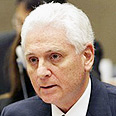
UN criticizes Israel for Golan Heights annexation
Human Rights Council passes two resolutions criticizing Israel, but keeps its record intact of singling out no other country for human rights abuses
The 47-nation council, which has censured only Israel since it began operating six months ago, this time took the Jewish state to task for its occupation of Syria's Golan Heights and for building settlements in occupied Arab territories.
The council voted 32-1 with 14 abstentions to declare illegal Israel's 1981 annexation of the Golan Heights and demand that Israel rescind its decision to impose its laws and jurisdiction on the area, which it captured in the 1967 Middle East war. Canada, which said the resolution was unbalanced, was the only no vote, and European Union members abstained.
Then it voted 45-1 to demand Israel reverse its policy of building and expanding settlements as a first step toward dismantling them. Again, Canada was the only country to vote against the resolution.
The United States and Israel are not members, but Israel's ambassador to the UN in Geneva said Syria had proposed the Golan Heights resolution "purely to draw attention away from its ... own deplorable human rights record."
"Under Syrian possession, the Golan Heights were used to launch constant attacks against Israeli civilians," Itzhak Levanon said. "Today, the Golan Heights is more peaceful than ever, stable and thriving. The economy is booming, fields are blossoming, and everyone is enjoying the benefits of democracy."
The resolution said Israel should "desist from changing the physical character, demographic composition, institutional structure and legal status of the occupied Syrian Golan" and allow the displaced population to return to their homes.
Levanon said the settlements resolution "pointedly fails to acknowledge Israel's good will in the complete dismantling of its settlements in Gaza in June 2005, and withdrawal from settlements in the northern West Bank, unilateral moves which only served to create an ever-worsening security situation for Israeli civilians."
Resolutions on Israel in 3 emergency sessions
The five-page resolution also denounced Israel's decision to build a tramway or streetcar line between west Jerusalem and Pisgat Zeev, an Israeli neighborhood in disputed east Jerusalem. The resolution also criticized restrictions on the movement of Palestinians, including the "construction, contrary to international law, of the wall inside the occupied Palestinian territory."The council, which replaced the widely discredited Human Rights Commission last June, has passed resolutions on Israel in regular session and in three emergency sessions, blasting Israel for its military campaign in Lebanon and its treatment of Palestinians in the West Bank and Gaza Strip.
The council has pending resolutions on Darfur, where Sudanese government forces and militias it supports have been accused of committing widespread atrocities against civilians in their attempt to put down a three-year rebellion, but it took no action on them.
One, proposed by the European Union, holds the government responsible for protecting civilians, but diplomats said it was unlikely that it will ever come to a vote because a much weaker resolution, submitted by Algeria on behalf of African countries, calls on "all sides" to end abuses and praises the government for its cooperation with the UN rights investigator.
Earlier China, Cuba, Arab and African countries had already demonstrated their dominance of the new council by forcing through a resolution recommending a "code of conduct" for UN human rights experts, in an indication of the strength of countries which some human rights organizations say are determined to rein in the experts who submit critical reports on countries to the council.
The measure doesn't spell out what should be in the code of conduct, but requests that an intergovernmental group draft guidelines.
The independent experts, who have been assigned to some of the world's worst rights abusers, often anger the governments they report on.
There already have been moves in the UN General Assembly to discourage UN human rights bodies from adopting resolutions condemning the human rights situation in any country.










